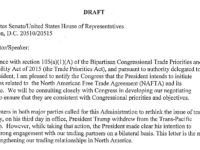The leak of the draft notice from the Trump Administration on the NAFTA renegotiation, which identifies at least 40 issues, will serve as the starting point for discussions once talks begin. Coverage of the U.S. interests has emphasized tariff issues, rules of origin, and tax treatment, but the digital issues should not be overlooked. The U.S. starting position looks a lot like the TPP, which suggests that we already have a very clear understanding of the text that U.S. negotiators will propose. This post unpacks some of the general language to decipher what the U.S. has in mind on intellectual property issues. A second post will review the other digital issues, including privacy and e-commerce rules.
Archive for March, 2017
Fixing PIPEDA: My Appearance Before the Access to Information, Privacy & Ethics Committee
Last week I appeared before the House of Commons Standing Committee on Access to Information, Privacy and Ethics as part of its review of PIPEDA, Canada’s private sector privacy law. The ETHI study is expected to last several months and may provide the foundation for potential reforms. My opening remarks are posted below:
What Would a Digital Economy-Era NAFTA Mean for Canada?
U.S. Commerce Secretary Wilbur Ross is expected to file a notice of renegotiation of the North American free trade agreement within weeks, paving the way for talks that could reshape the Canadian economy. It became clear last week that the renegotiation will involve much more than just a few “tweaks”, as a U.S. congressional hearing saw officials trot out the usual laundry list of demands including changes to agricultural supply management, softwood lumber exports, and anti-counterfeiting measures.
Those issues will undoubtedly prove contentious, yet my Globe and Mail article notes that more interesting were comments from Mr. Ross about the need for new NAFTA chapters to reflect the digital economy. The emphasis on digital policies foreshadows a new battleground that will have enormous implications for Canadian privacy laws and digital policies.
C’mon Uber: Sales Taxes on Uber Rides Are Not a “Tax on Innovation”
Yesterday’s federal budget included plans to amend the law to ensure that GST/HST is applicable to ride sharing services such as Uber. The budget states that the government will:
Amend the definition of a taxi business under the Excise Tax Act to level the playing field and ensure that ride-sharing businesses are subject to the same GST/HST rules as taxis.
This change should not be particularly controversial. No one likes paying taxes, but equal application of sales taxes ensures appropriate revenue collection and a level-playing field for all businesses in the sector. As I noted in an earlier post, I expect that this is a first step toward extending requirements to collect and remit sales taxes on foreign digital services such as Netflix and Spotify. Applying sales taxes to all foreign digital services is complicated – there needs to be thresholds implemented to ensure that administrative costs do not outweigh revenues collected – but Uber is well established in Canada with many local jurisdictions establishing a regulatory framework for the service.











